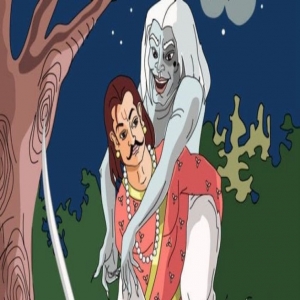

When I was quite young, my mother used to tell me stories and lull me to sleep. Like the vetala of the Vikram and Vetala stories, she asked several questions after finishing a story. Luckily, she didn't tell me that my little head would blow up if I failed to answer her questions. And if I happened to blink with a smile, she answered all her questions and made me learn about the ways of the world.
On one such occasion, she narrated the story of two diseases. Once it happened that two diseases, which were twins, invaded a village. One walked into a poor man's hut and the other into a rich man's house. In the days of yore, parents had a minimum of half a dozen children, and so the two diseases found delight in disturbing the health of the youngest in the chosen houses.
As the poor child was destined to go hungry most of the time, its parents attributed the disease to its empty stomach and didn't care a whit about it. Whereas the sick child of the rich man was greatly taken care of. Nutritious food, pills of different colours, and syrups of varied tastes were given to the child three or four times daily.
The disease loved to remain in the rich man's child forever, gluttonously grabbing all the things given with affection and love. Hence, the disease refused to budge. But the disease that caught hold of the poor man's child liked to go away for fear of staying on an empty stomach. So, it came out of the poor man's child and straight away went to meet its sibling and asked for company when running away from the village. Then the rich child's disease heckled and said, "Neither now nor in the future… I would like to live rich." The other disease went away from that village, searching for a rich man.
"Well…well… why did the poor child's disease take to its heels?" That was my mother's question. Poor Vikramaditya, that was me, as usual, blinked with a smile. And my mother gave the answer: "That was because the poor child had never complained, for it knew that there was no use in complaining. And so, learn to bear your pains and aches with a grin. Whatever gives you problem in life will vanish without a trace. It takes some time. So don't complain. For Heaven's sake don't nurture it." That lesson was very useful to me when I grew up.
Don't you have any complaints to make? If 'no' is the answer from your side, then you are a blessed being. That means you count only your blessings while others are adding up their troubles. The eminent Victorian novelist Charles Dickens once remarked: "Reflect upon your present blessings, of which every man has plenty, and not on your past misfortunes of which all men have some."
Troubles are like newborn babes. They grow bigger by nursing. Yet people want to unload their complaints on others. All that they want to hear from others is: "O! We are sailing in the same boat." Those who sympathise with the complainers may say so. But some people laugh up their sleeves all the time. Some people laugh their heads off without knowing what is in store for them. That is the way of the world.
From the moment people get out of bed, they have a lot of complaints to make. One snivels about poor sleep. Another of the nightmares he had last night. Yet another whines about being unable to sleep. And one more about disturbed sleep. Yet the family members know pretty well that these bellyachers slept like logs.
The sniveller in each human being awakens immediately with them. One says, "There is no water in the bathroom". Another says, "Open the tap and all that you get is only sewage water." When we move to the dining room of our house, one complains of not enough vegetables in the sambhar (a lentil and vegetable soup). Another complains, "Rasam lacks salt." Yet another says, "The water we drink should be lukewarm and not sizzling hot. This will scathe the tongue." Yet another says, "Water should be chill on the tongue and throat to cool the system." Huh!? Why not these complainers cook for themselves rather than find fault with their mothers or their wives!?
When we step out of the house, we complain of heat waves, pouring rain, hurting feet, aching back, or poor vision. Complaints, complaints, and even more complaints. It is as if people have nothing positive to talk about. What we fail to understand is that complaining is a terrible waste of energy and time. Complaining is not an answer to the challenges in life. The pessimist always complains, and the optimist counts his blessings.
A Tamil proverb goes: "Had God taught us to eat stones and sand dunes, and feel satisfied with them...." Well! Again, that too is a complaint. We live with complaints and die with them. Is there any other way?